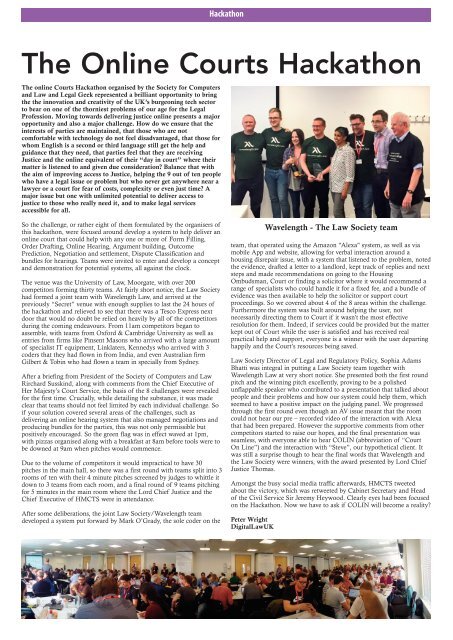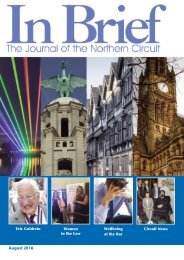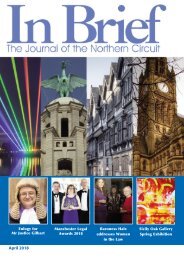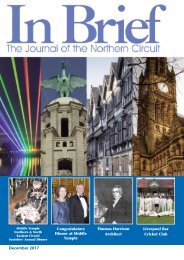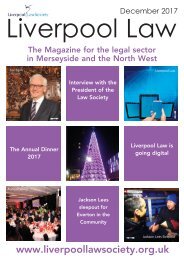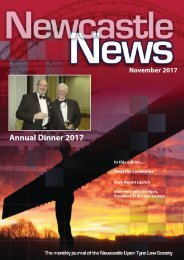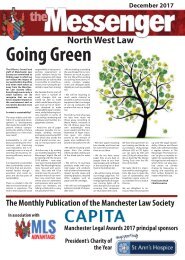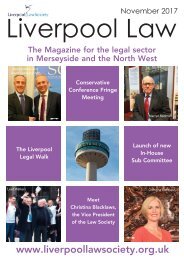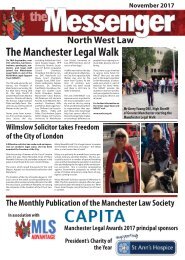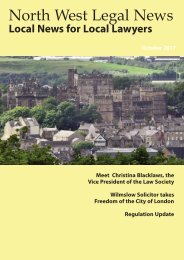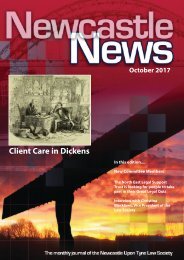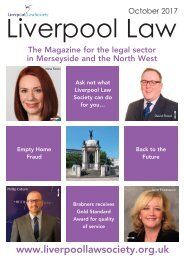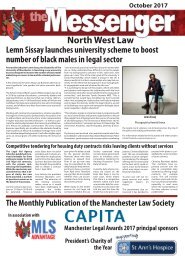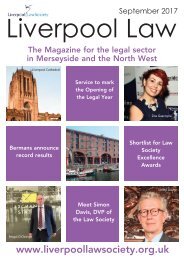Liverpool Law Aug 2017
Create successful ePaper yourself
Turn your PDF publications into a flip-book with our unique Google optimized e-Paper software.
Hackathon<br />
The Online Courts Hackathon<br />
The online Courts Hackathon organised by the Society for Computers<br />
and <strong>Law</strong> and Legal Geek represented a brilliant opportunity to bring<br />
the the innovation and creativity of the UK’s burgeoning tech sector<br />
to bear on one of the thorniest problems of our age for the Legal<br />
Profession. Moving towards delivering justice online presents a major<br />
opportunity and also a major challenge. How do we ensure that the<br />
interests of parties are maintained, that those who are not<br />
comfortable with technology do not feel disadvantaged, that those for<br />
whom English is a second or third language still get the help and<br />
guidance that they need, that parties feel that they are receiving<br />
Justice and the online equivalent of their “day in court” where their<br />
matter is listened to and given due consideration? Balance that with<br />
the aim of improving access to Justice, helping the 9 out of ten people<br />
who have a legal issue or problem but who never get anywhere near a<br />
lawyer or a court for fear of costs, complexity or even just time? A<br />
major issue but one with unlimited potential to deliver access to<br />
justice to those who really need it, and to make legal services<br />
accessible for all.<br />
So the challenge, or rather eight of them formulated by the organisers of<br />
this hackathon, were focused around develop a system to help deliver an<br />
online court that could help with any one or more of Form Filling,<br />
Order Drafting, Online Hearing, Argument building, Outcome<br />
Prediction, Negotiation and settlement, Dispute Classification and<br />
bundles for hearings. Teams were invited to enter and develop a concept<br />
and demonstration for potential systems, all against the clock.<br />
The venue was the University of <strong>Law</strong>, Moorgate, with over 200<br />
competitors forming thirty teams. At fairly short notice, the <strong>Law</strong> Society<br />
had formed a joint team with Wavelength <strong>Law</strong>, and arrived at the<br />
previously “Secret” venue with enough supplies to last the 24 hours of<br />
the hackathon and relieved to see that there was a Tesco Express next<br />
door that would no doubt be relied on heavily by all of the competitors<br />
during the coming endeavours. From 11am competitors began to<br />
assemble, with teams from Oxford & Cambridge University as well as<br />
entries from firms like Pinsent Masons who arrived with a large amount<br />
of specialist IT equipment, Linklaters, Kennedys who arrived with 3<br />
coders that they had flown in from India, and even Australian firm<br />
Gilbert & Tobin who had flown a team in specially from Sydney.<br />
After a briefing from President of the Society of Computers and <strong>Law</strong><br />
Rirchard Susskind, along with comments from the Chief Executive of<br />
Her Majesty’s Court Service, the basis of the 8 challenges were revealed<br />
for the first time. Crucially, while detailing the substance, it was made<br />
clear that teams should not feel limited by each individual challenge. So<br />
if your solution covered several areas of the challenges, such as<br />
delivering an online hearing system that also managed negotiations and<br />
producing bundles for the parties, this was not only permissible but<br />
positively encouraged. So the green flag was in effect waved at 1pm,<br />
with pizzas organised along with a breakfast at 8am before tools were to<br />
be downed at 9am when pitches would commence.<br />
Due to the volume of competitors it would impractical to have 30<br />
pitches in the main hall, so there was a first round with teams split into 3<br />
rooms of ten with their 4 minute pitches screened by judges to whittle it<br />
down to 3 teams from each room, and a final round of 9 teams pitching<br />
for 5 minutes in the main room where the Lord Chief Justice and the<br />
Chief Executive of HMCTS were in attendance.<br />
After some deliberations, the joint <strong>Law</strong> Society/Wavelength team<br />
developed a system put forward by Mark O’Grady, the sole coder on the<br />
team, that operated using the Amazon "Alexa" system, as well as via<br />
mobile App and website, allowing for verbal interaction around a<br />
housing disrepair issue, with a system that listened to the problem, noted<br />
the evidence, drafted a letter to a landlord, kept track of replies and next<br />
steps and made recommendations on going to the Housing<br />
Ombudsman, Court or finding a solicitor where it would recommend a<br />
range of specialists who could handle it for a fixed fee, and a bundle of<br />
evidence was then available to help the solicitor or support court<br />
proceedings. So we covered about 4 of the 8 areas within the challenge.<br />
Furthermore the system was built around helping the user, not<br />
necessarily directing them to Court if it wasn’t the most effective<br />
resolution for them. Indeed, if services could be provided but the matter<br />
kept out of Court while the user is satisfied and has received real<br />
practical help and support, everyone is a winner with the user departing<br />
happily and the Court’s resources being saved.<br />
<strong>Law</strong> Society Director of Legal and Regulatory Policy, Sophia Adams<br />
Bhatti was integral in putting a <strong>Law</strong> Society team together with<br />
Wavelength <strong>Law</strong> at very short notice. She presented both the first round<br />
pitch and the winning pitch excellently, proving to be a polished<br />
unflappable speaker who contributed to a presentation that talked about<br />
people and their problems and how our system could help them, which<br />
seemed to have a positive impact on the judging panel. We progressed<br />
through the first round even though an AV issue meant that the room<br />
could not hear our pre – recorded video of the interaction with Alexa<br />
that had been prepared. However the supportive comments from other<br />
competitors started to raise our hopes, and the final presentation was<br />
seamless, with everyone able to hear COLIN (abbreviation of “Court<br />
On Line”) and the interaction with “Steve”, our hypothetical client. It<br />
was still a surprise though to hear the final words that Wavelength and<br />
the <strong>Law</strong> Society were winners, with the award presented by Lord Chief<br />
Justice Thomas.<br />
Amongst the busy social media traffic afterwards, HMCTS tweeted<br />
about the victory, which was retweeted by Cabinet Secretary and Head<br />
of the Civil Service Sir Jeremy Heywood. Clearly eyes had been focused<br />
on the Hackathon. Now we have to ask if COLIN will become a reality?<br />
Peter Wright<br />
Digital<strong>Law</strong>UK<br />
Wavelength - The <strong>Law</strong> Society team


